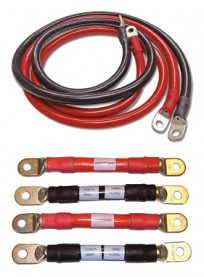Ok. I have a 100 watt solar panel. I was using 16 ga. Wire this morning (16 ga. output from charge controller. Input is 10 ga 25 ft. Copper.) it's going into a 300 watt pure since inverter. Powering a 60 watt mini fridge. ) it was working fine, through a car Bart 12v. 12.7 volts. Then it was 12.1 volts but still going. I noticed wire clamps getting warm/ hot after 1/2 hour so I upgraded the output wire from charge controller to 12ga copper. Turned on the inverter, fridge still plugged in, and it blew the 30 amp fuse.
Any ideas? Thinking of using a power strip next time so I have on and off.
Any ideas? Thinking of using a power strip next time so I have on and off.

Comment